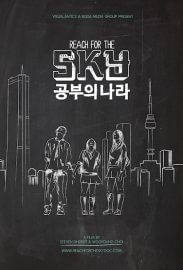
https://www.filmplatform.net/product/reach-for-the-sky
Every year, on the 2nd Thursday of November, the entire country of South-Korea is put to the test. That day, more than half a million high school seniorstudents take part in the National University Exam, better known as Suneung.
Reach for the Sky tells the story of several South-Korean high school students, their families and teachers, as they prepare for the annual National Exam. The exam will not only determine where the high school seniors will attend university but ultimately also their status in the Korean hierarchical society.

Every year, on the 2nd Thursday of November, the entire country of South-Korea is put to the test. That day, more than half a million senior high school students take part in the National Exam, better known as suneung siheom in Korean.
On the morning of Suneung, companies – even the Korean stock market – open up for business an hour later than usual to reduce traf c jams. Those students who do get stuck in traf c can dial 112, a number normally reserved for emergencies, to get a special police escort to their school. In some parts of the country, military police vehicles, ambulances, and food delivery motorcycles have reportedly been deployed to accommodate the most desperate of students.
That day, few planes are allowed to land or take off, so students can fully concentrate on the listening tests of the examination. Parents ock todo the exam centres where they spend most of the day praying while holding on to the closed school gates. Some can be found praying at Buddhist temples with their child’s photo and exam day identi cation form lain on the temple oor.
Months or even years before the exam takes place, Korean students often live a life of strict routine. On an aver- age day they get up as early as 6am to go to school. When school is nished, they then attend a hagwon, a private academy, where they are primed for the big day for months in a row. Usually the school day comes to an end when they arrive home well after midnight.
Suneung isn’t a regular high school test. The test will not only determine where the high school seniors will at- tend university but ultimately also their status in the Korean hierarchical society. At the most prestigious universi- ties, spaces for freshmen are very limited, with chances of acceptance being less than 1%.
Getting into a university with a good reputation is one of the most competitive experiences Korean students will ever experience in their life.
[… ] the Committee reiterates its concern that the highly competitive nature of the education system risks hampering the development of the child to his or her fullest potential.
Concluding observations: Republic of Korea, 2003 – United Nations Committee On The Rights Of The Child
The above decision of the UN Committee re ects a core theme of our documentary: No matter how important education might be, it should never be at the cost of the self-development of a child. By taking away a child’s right to play, its creativity is sti ed. Ultimately, academic education should bene t and complement
the development of a child, not restrict it.
Statistically it is clear that the pressure Korean students have to deal with is more than problematic. South-Korea has the highest suicide rate among the OECD countries. Between 2007 and 2009 suicide was the leading cause of death among students aged 15 to 24. Every month 2 students take their own life.
75% of students committing suicide are in high school.
The Ministry of Education is aware of the problems this overemphasis on credentials has created and has undertaken many attempts to reform its system but to little avail. The underlying cause of this is not to be found within a failing educational system, but in society as a whole. As long as a degree from a prestigious university is considered a status symbol by parents and a decisive requirement for employment little will change. A fundamental shift in mentality is needed, but it’s quite clear this will not happen overnight.
‘Reach for the SKY’ is a documentary about a society where education has become a multi-billion industry because of its obsessions with achievement and status; about a culture where education has become as important as the type of car you drive or the size of your apartment; where mothers have become the educational agents of their children, micro-managing every hour that could be spent on studying.
But at its core, it’s a lm about the right of every child to play and self-develop. After many years of intense studying, many teenagers are emotionally spent. One day they wake up, happy to learn they have been accepted to the university they wanted to get in to so badly. They are confronted with the realization that they didn’t really know what they were studying for. For these students, reaching for the sky wasn’t so much a future dream, but merely a test score on a university application letter.